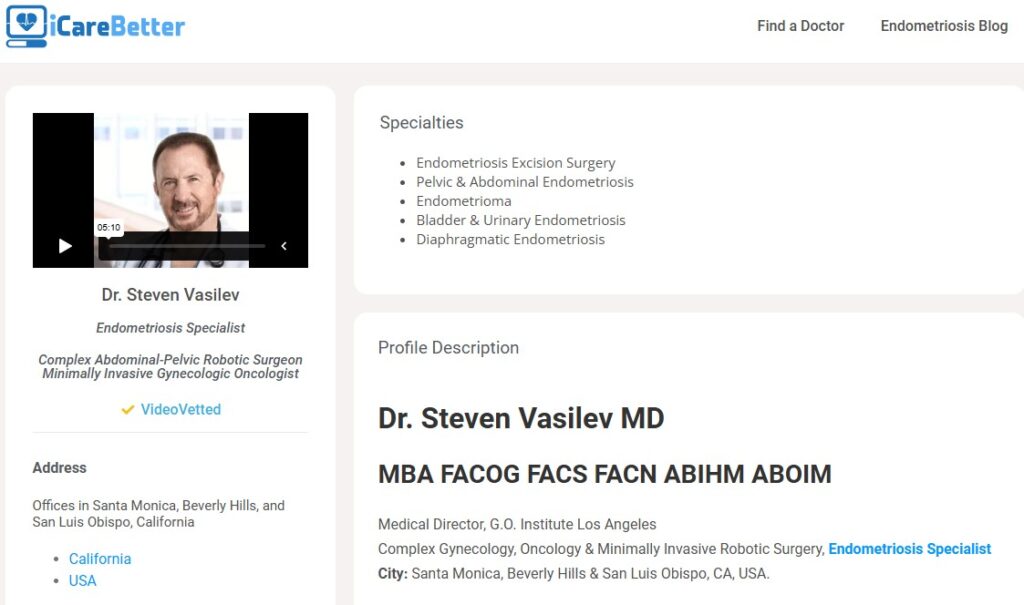For individuals fighting with the challenges of endometriosis, finding a knowledgeable and experienced endometriosis specialist can be a game-changer in managing symptoms and improving quality of life. This guide aims to empower you with the information and tools needed to locate and connect with endometriosis experts in your area.
Table of contents
- Breaking the Chains of Pain: Your Journey to Endometriosis Treatment Starts Here
- Decoding Endometriosis Symptoms Checklist
- What Are the Benefits of Seeing an Endometriosis Specialist Near You?
- How to Find Endometriosis Doctor Near You
- What to Expect in Preparing for Endometriosis Consultation
- The Importance of Follow-Up Care
- References:
Breaking the Chains of Pain: Your Journey to Endometriosis Treatment Starts Here
Endometriosis affects approximately 1 in 10 women of reproductive age, yet many struggle to receive an accurate diagnosis and effective treatment. The journey to finding relief often begins with identifying a doctor who specializes in this complex condition. This condition can feel like an endless cycle of pain, uncertainty, and exhaustion.
Not all doctors are created equal. Endometriosis details demand a level of expertise that goes beyond general gynecological knowledge. Specialists dedicated to endometriosis possess an in-depth understanding of its various manifestations, the latest treatment modalities, and cutting-edge research.
But taking that first step toward reclaiming your life is powerful—and achievable.
Let’s explore the crucial steps and considerations in your quest for expert endometriosis care near you!
Decoding Endometriosis Symptoms Checklist
Before starting your search for a specialist, it’s crucial to understand your symptoms. Endometriosis can manifest in various ways, and recognizing these signs and symptoms can help you communicate effectively with doctors.
Common Endometriosis Symptoms Include:
- Severe menstrual cramps that may worsen over time
- Chronic pelvic pain, even between periods
- Pain during or after sexual intercourse
- Gastrointestinal issues, such as bloating, constipation, or diarrhea
- Urinary problems, including frequent urination or pain while urinating
- Fatigue and low energy levels
- Difficulty conceiving or infertility
Keep a detailed log of your symptoms, noting their frequency, intensity, and any patterns you observe. This information will be invaluable when discussing your condition with specialists and can aid in developing an accurate diagnosis and treatment plan.
What Are the Benefits of Seeing an Endometriosis Specialist Near You?
Opting for a provider with expertise in endometriosis offers numerous advantages. These specialists bring a wealth of knowledge and experience to the table, which can significantly impact your treatment outcomes and overall experience.
Some key benefits include:
- Accurate diagnosis: Endometriosis can be challenging to diagnose, often leading to delays in treatment. Specialists are adept at recognizing subtle signs and symptoms that other practitioners might overlook.
- Advanced treatment options: Endometriosis experts are well-versed in the latest treatment modalities, including minimally invasive surgical techniques and integrative medical therapies.
- Personalized care: With a deep understanding of the condition’s complexities, specialists can tailor treatment plans to address your specific symptoms and goals.
- Comprehensive management: Many endometriosis specialists take a holistic approach, considering factors such as nutrition, hormones, lifestyle, and mental health in addition to medical interventions.
- Improved quality of life: With targeted, expert care, many patients experience significant symptom relief and enhanced overall well-being.
Advanced Diagnostic Tools
Recent advances in endometriosis care are revolutionizing diagnosis and treatment for this complex condition. Here’s a look at the latest innovations bringing hope and relief to millions affected by endometriosis:
- High-Resolution Imaging: Techniques such as MRI and ultrasound have greatly improved, offering clearer and more detailed images of endometriosis lesions. These tools help specialists assess the presence and extent of endometriosis, including hard-to-detect deep infiltrating endometriosis (DIE).
- Biomarker Research: Blood tests for specific biomarkers are currently being studied to detect endometriosis without invasive procedures. While still under development, biomarkers hold promise for faster, non-surgical diagnosis.
- AI and Machine Learning: Artificial intelligence is now used to interpret symptoms and imaging data, helping doctors make more accurate diagnoses by identifying patterns often missed in traditional scans. This technology enhances diagnostic accuracy and may soon reduce the need for exploratory surgeries.
Innovative Treatment Approaches
- Excision Surgery: Excision surgery is the gold standard for endometriosis removing lesions to reduce pain, improve fertility, and lower recurrence. Many specialists now use robotic-assisted surgery for greater precision and faster recovery.
- Hormonal Therapies: Newer hormonal therapies selectively target and suppress hormones that fuel endometriosis. These medications can effectively reduce symptoms while avoiding some of the side effects associated with older treatments.
- Immune-Modulating Drugs: Since endometriosis involves immune system dysfunction, researchers are investigating immune-modulating drugs to help manage the inflammatory response. These therapies may lessen the immune response that triggers pain and disease progression.
- Pelvic Floor Physical Therapy: Pelvic floor physical therapy has gained popularity as a supportive treatment for endometriosis-related pelvic pain. This therapy can enhance overall comfort and complement other treatments by releasing tension and improving muscle function.
- Integrative and Holistic Treatments: Integrative therapies like acupuncture, dietary changes, and lifestyle adaptations offer relief for many patients. An anti-inflammatory diet, mindfulness, and yoga can help manage symptoms for a balanced approach to care.
- Regenerative Medicine and Stem Cell Therapy: Regenerative medicine and stem cell therapies, though in early stages, are being studied for their potential to repair tissues damaged by endometriosis. It can offer future options for pain relief and improved reproductive health.
New diagnostics, refined surgeries, and emerging treatments make the future of endometriosis care promising. These advancements offer hope for better symptom management, improved quality of life, and expanded treatment options.
How to Find Endometriosis Doctor Near You
At iCareBetter, we believe that endometriosis care should be exceptional, specialized, and accessible. This is why our directory features the best endometriosis specialists—professionals who have been thoroughly vetted and have proven experience in treating this complex condition. We have a unique vetting process that includes video evaluations, where doctors demonstrate their surgical techniques and approach to endometriosis treatment. This ensures that each doctor listed on iCareBetter as video-vetted has the skill, experience, and dedication needed to provide top-tier care for endometriosis patients.
How to Find an Endometriosis Specialist Near You on iCareBetter

- isit iCareBetter.com: Start by going to icarebetter.com. From the homepage, you’ll see options to search for endometriosis specialists and additional resources for learning about endometriosis and treatment options.
- Use the Search Tool: On our specialist directory page, you’ll find a search tool that allows you to enter your location. Simply type in your city, state, or zip code, and the directory will show specialists available in or near your area.
- Filter by Specialty: You can filter your search to find specialists who focus on endometriosis, particularly those experienced in techniques like excision surgery, pain management, or fertility preservation. This ensures you connect with a doctor who meets your specific treatment needs.
- Read Doctor Profile: Each doctor’s profile includes a detailed description of their expertise, treatment philosophy, and patient reviews.
- Video-Vetted Specialist: iCareBetter has video-vetted specialists who demonstrate their surgical and treatment approaches, explaining their methodologies and patient outcomes. Each doctor undergoes a thorough video vetting process, which confirms their proficiency in advanced surgical techniques and patient-centered care. This process allows iCareBetter to see the effectiveness of each specialist’s approach to endometriosis care. This also ensures you’ll find a doctor who is not only experienced but also deeply committed to helping endometriosis patients achieve the best possible outcomes. When a doctor becomes video-vetted, they receive a sign on their profile stating they are vetted.
- Contact the Specialist: Once you’ve found a specialist you’re interested in, you can contact them directly to schedule a consultation or learn more about their practice.

What to Expect in Preparing for Endometriosis Consultation
Your first consultation for endometriosis is crucial to finding relief and understanding your treatment options. You must be prepared and know what to expect to help you make the most of your visit.
- Gather your medical records: Compile a comprehensive medical history, including any previous diagnoses, treatments, and test results related to your symptoms.
- Prepare a symptom journal: Bring detailed notes about your symptoms, including their frequency, severity, and impact on your daily life.
- List your medications: Include all current medications, supplements, and any alternative therapies you’re using.
- Formulate questions: Write down any questions or concerns about your condition, potential treatments, or the specialist’s approach to care.
- Bring a support person: Consider having a trusted friend or family member accompany you to help take notes and provide emotional support.
- Be ready to discuss your goals: Think about what you hope to achieve through treatment, whether it’s pain relief, fertility preservation, or improved overall quality of life.
Key Questions to Ask Your Endometriosis Specialist
During your appointment, don’t hesitate to ask questions that will help you better understand your condition and treatment options. Some critical questions to consider include:
- What stage of endometriosis do you suspect I have, and how can we confirm the diagnosis?
- What treatment options do you recommend, and why?
- If surgery is recommended, what type of procedure do you suggest, and what are the potential risks and benefits?
- Who will participate in the surgery? Do you have a colorectal surgeon and urologist?
- How many endometriosis surgeries do you perform annually?
- What can I expect regarding symptom relief and recovery time with the proposed treatment?
- Are there any lifestyle changes or complementary therapies you recommend alongside medical treatment?
- How do you approach fertility preservation in endometriosis patients?
- What is your philosophy on long-term management of endometriosis?
- Do you collaborate with other specialists, such as pain management experts or fertility specialists?
- Are there any clinical trials or research studies I might be eligible for?
Understanding Treatment Options
Endometriosis specialists typically offer a range of treatment options tailored to each patient’s unique situation. These may include:
- Medical management: hormonal therapies, pain medications, or other drugs to manage symptoms.
- Surgical interventions: laparoscopic excision surgery to remove endometriosis lesions is often considered the gold standard for treatment.
- Fertility treatments: For patients struggling with infertility due to endometriosis.
- Pain management techniques: Include physical therapy, acupuncture, or nerve blocks.
- Lifestyle modifications: dietary changes, stress reduction techniques, and exercise regimens to support overall health and symptom management.
- Complementary therapies: such as pelvic floor therapy, cognitive behavioral therapy, or nutritional counseling.
Your specialist should discuss these options in detail, explaining the pros and cons of each approach and how they align with your specific goals and circumstances.
The Importance of Follow-Up Care
Managing endometriosis is often an ongoing process, and regular follow-up appointments with your specialist are crucial. These visits allow for:
- Monitoring of symptom progression or improvement
- Adjustments to your treatment plan as needed
- Addressing any new concerns or side effects
- Discussing long-term management strategies
- Exploring emerging treatment options or research developments
Be proactive in scheduling these follow-up appointments and maintaining open communication with your specialist between visits.
Your Next Step Towards a Pain-Free Life
Finding the right endometriosis specialist is crucial to reclaiming your health and well-being. By understanding the importance of specialized care, knowing how to locate and evaluate potential specialists, and preparing for productive appointments, you can take control of your endometriosis management.
With the right specialist by your side and a comprehensive treatment plan tailored to your needs, you can look forward to improved symptom management and a better quality of life. Your path to relief and understanding starts with taking that first step toward finding expert care. Empower yourself with knowledge, trust your instincts, and never give up hope for a life less burdened by endometriosis.
References:
https://www.medifind.com/conditions/endometriosis/1797/doctors
https://www.castleconnolly.com/expertise/endometriosis
https://www.speakendo.com/endometriosis-resources/doctor-locator




